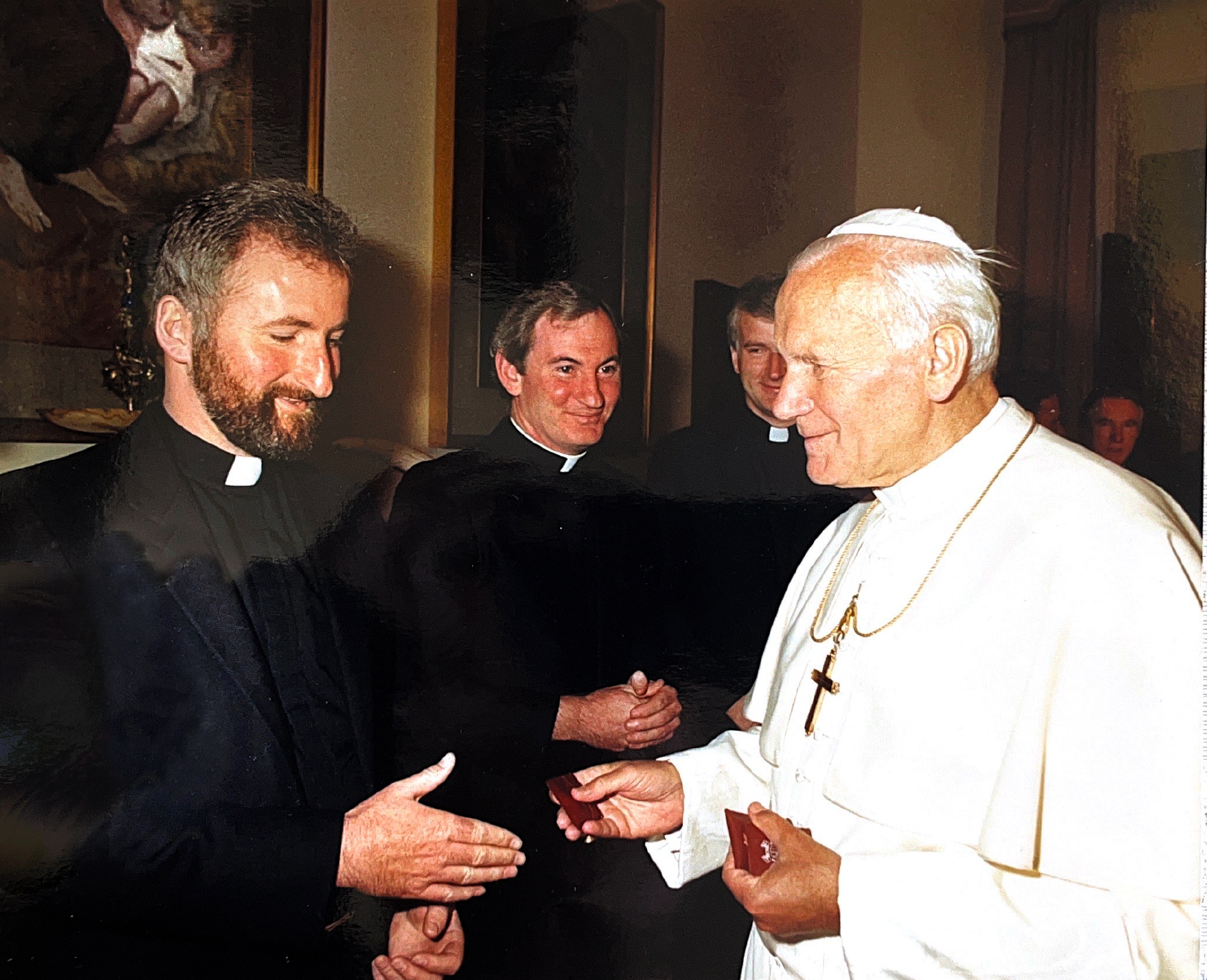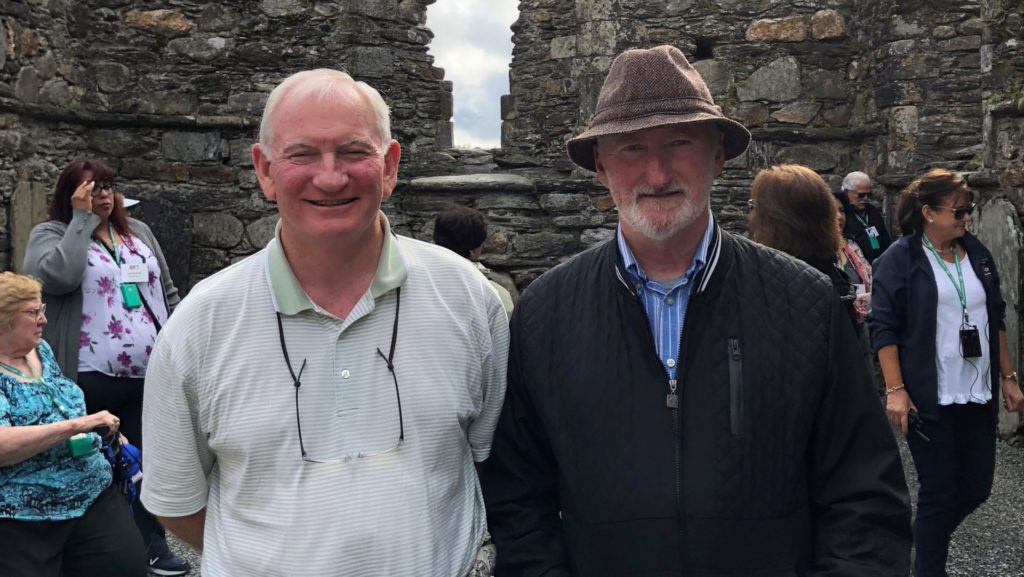This story is part of a series featured in a commemorative issue honoring Bishop David O'Connell. Read more stories at the Bishop Dave Commemorative Issue web page.
To remember his dear friend Bishop David O’Connell, Msgr. Jarlath “Jay” Cunnane resorted to a joke that David often told to explain the different characters of their native counties in Ireland: Sligo and Cork.
“A Cork man might leave without saying goodbye,” said Cunnane in his homily at O’Connell’s March 3 funeral at the Cathedral of Our Lady of the Angels. “A man of Sligo would say goodbye, but he wouldn’t leave.”
A relief of laughter rippled through the cathedral in that moment — humor shrank it to a chapel. But the cruel reality was lost on no one. O’Connell had left this world without saying goodbye.
Among the other friends he left quietly was Martin Ashe, an auxiliary bishop in Melbourne, Australia, who made the trip to Los Angeles for O’Connell’s funeral. Ashe, Cunnane, and O’Connell had all been seminary mates at All Hallows College in Dublin.
In their memories, O’Connell was something of a rebel. There was the time he and Ashe went to a comedy club to interpret an onstage adaptation of the popular Irish comedic television twosome, Cha and Miah. O’Connell played Miah, the clown to Cha’s more serious philosopher.
“They were dressed in their long, old grubby coats and caps sitting on a wall on the street, cracking jokes,” as Ashe described them.
The act earned them a summons to the seminary rector’s office. A couple of their jokes had pushed the envelope. “Time to tone it down!” he told O’Connell.
To Cunnane, who first met O’Connell in 1971, those were best understood as “rebellious times.”
“Let’s just say Dave would not have been voted the most likely to succeed, more likely — to be expelled from seminary!”
He recalled the convener of the Second Vatican Council, St. Pope John XXIII, wanting to “open the windows of the Church.”
“Well, Dave took that as an invitation to jump out the seminary windows, to go to town,” Cunnane smiled. “He was inclined to challenge the staff members in class.”
After O’Connell’s ordination to the diaconate was initially held up in Dublin, Cardinal Timothy Manning of Los Angeles performed the deed in 1978, one year after Cunnane arrived to LA as a newly ordained priest.

What had brought each to the priesthood in the first place? It may have been solitude itself — and loss. In Cunnane’s case, it was a disability: “My struggles with stuttering drove me to seek solace in prayer.”
For O’Connell, it was the death of his beloved father when he was only 17. David Sr. died literally with his beet field inspector’s boots on — red wingtips that had been sent over from relatives in America. Those American red shoes were the last image the son retained of his father.
“He had to change schools,” Cunnane said. The world saw the antics and rebelliousness. But inside something else was going on. O’Connell took long walks saying the rosary, musing on the shortness of life, the urge to do something greater in memory of his much-beloved father.
Years later, the two would reflect on the parallels in their callings.
“That pattern born of prayer out of isolation and pain was for both of us an essential part of the vocation,” Cunnane recalled.
If isolation birthed it, community was what helped the two Irishmen halfway around the world grow in their missionary vocations.
Soon they had the adventure of a lifetime, arm-in-arm under the sunshine of Southern California bringing back parishes whose numbers were dwindling, evangelizing the poorer sections of South Los Angeles, advocating for immigrants, and even mediating amid great social upheavals, as O’Connell did after the Rodney King riots.
“I really didn’t like the idea of being a priest in Ireland,” O’Connell told the Los Angeles Times in 2001. “You spend 30 years being a curate, an associate pastor — you’re a glorified altar boy, basically. … Whereas here, there’s so much to be done, you have a lot of freedom to work hard.”
They were following a tradition, the misty green to the dusty brown by the Pacific Ocean — though always the ocean! By the time O’Connell and Cunnane were ordained, All Hallows had produced some 4,000 priests since the mid-19th century to serve around the world — about 1,000 of them in California.
Opposites attract, no doubt. Cunnane is the fourth generation of his family to serve in the Golden State. It began with a great-great uncle who was pastor in St. Patrick Church in Watsonville, where many of the early artichoke, berry, and potato farmers spoke Gaelic.

Both friends learned Spanish, a key ingredient for success with many Southland souls. They also brought joy, zeal, and not a little humor. Cunnane spent years at St. Thomas the Apostle Church, a heavily Central American immigrant parish in LA’s Pico-Union neighborhood. O’Connell won hearts at St. Frances X. Cabrini Church on Imperial Highway east of LAX Airport as pastor from 1987 to 1999, and at a handful of other parishes in the area in the years that followed.
When Cunnane arrived in 2011 to Our Lady of Grace Church in Encino, my childhood parish, I witnessed the upper middle-class suburban pews begin to fill with Latino, African, and Asian immigrant families. He left in 2019 and went to St. Cornelius Church in Long Beach to be near an ailing brother. My mother, Rose, 95, was among the many who lamented Cunnane’s leaving.
In 2020, Cunnane suffered a dangerous artery blockage to the heart. O’Connell visited his old friend nearly every day in the hospital for what they came to call the “Kombucha run.”
As Cunnane explained it, “I had developed a yearning for kombucha, or anything that would put a taste in my mouth.”
Over the years, the two shared their mutual love of books at Thursday night dinners together. They favored the mid-century Irish poet Patrick Kavanaugh, they quoted “Four Quartets” of T.S. Eliot (“In my end is my beginning”), as well as Robert Frost. They were fond of the British novelist D.H. Lawrence, whose classic “Women in Love” contains one of literature’s great male friendships (Birkin and Gerald), whose women loves become friends, too. O’Connell had a steady friendship with the award-winning Irish novelist who had settled in Malibu, Brian Moore.
“I was more a ‘fool for books’ than Dave,” Cunnane admitted, invoking another Frost reference. “But he read more deeply and remembered more.”
What does it mean to be a ‘fool for books’? At one of my book signings for my biography of St. Junípero Serra, O’Connell came and sat in the front row. I was nervous, to say the least. But instead he beamed from ear to ear and put me at ease. I was honored. Another night we had dinner together — Jay, David, and I — at Café Bizou in Pasadena, which has sadly gone to its Maker. We three all ordered rack of lamb.
A real fool for books falls in love not only with flesh-and-blood people, but also with characters, which after all, are timeless. Who can forget Hester Prynne, Charles Darnay, Captain Ahab, or Emma?
Cunnane didn’t forget Tom Joad of Steinbeck’s “The Grapes of Wrath,” and even quoted him at O’Connell’s funeral as O’Connell himself had a few months earlier in a homily at a parish in Orange County: “Wherever there is a fight for the hungry to eat, I’ll be there. Wherever there is a victim of violence to be comforted, I’ll be there.”
Characters like Tom Joad are not real. But being timeless, they are, in a sense, super-real. Perhaps it is in books that we grasp the soul of man. That is where the fools go. It is also, of course, where we find Our Lord.
As Cunnane would recount later, the pair’s last dinner was two days before the bishop’s untimely death. They passed on their usual grilled fish and went all the way to Brentwood, where the owners of a restaurant had long been inviting them. A case of wine was given to them as a fundraiser for youth going to World Youth Day this summer in Lisbon.
“We had a wonderful meal,” Cunnane recalled with relish and a welling of eyes. “We both broke down and went for the lamb,” which, to him, was “a fitting last supper menu.” Worthy is the Lamb, indeed. As for O’Connell, “he was in great form, full of plans, going to invite me to speak at his parishes concerning a new religious education model.” Speak he did, quoting Yeats, “Think where man’s glory most begins and ends/And say my glory was I had such friends.”

